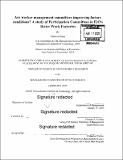| dc.contributor.advisor | Thomas A. Kochan. | en_US |
| dc.contributor.author | Khan, Mahreen. | en_US |
| dc.contributor.other | Sloan School of Management. | en_US |
| dc.date.accessioned | 2020-10-19T00:43:21Z | |
| dc.date.available | 2020-10-19T00:43:21Z | |
| dc.date.copyright | 2020 | en_US |
| dc.date.issued | 2020 | en_US |
| dc.identifier.uri | https://hdl.handle.net/1721.1/128104 | |
| dc.description | Thesis: S.M. in Management Research, Massachusetts Institute of Technology, Sloan School of Management, May, 2020 | en_US |
| dc.description | Cataloged from the official PDF of thesis. | en_US |
| dc.description | Includes bibliographical references (pages 55-59). | en_US |
| dc.description.abstract | The literature on global supply chains has extensively studied the enforcement of transnational regulatory mechanisms with regards to outcomes on working conditions in factories located in the global south. While the majority of the empirical work focused on the efficacy of these initiatives, none have systematically and quantitatively measured the impact of any voice facilitating mechanisms. On the other hand, industrial relations theory has argued that worker voice matters in an organizational context not just as a means of democratizing the workplace but also by providing workers a mechanism to address working conditions with management. I bring together these two sets of literature in my study of worker management participation committees - called PICCs¹- established as part of the International Labor Organization's Better Work program in Jordan, Vietnam and Indonesia. I analyze the association between PICCs and outcomes on violations with standards of working conditions by studying different features of the PICC structure. The goal is to empirically test if the prediction that facilitating voice through PICCs holds true and if so, which PICC features are most relevant in moving the needle on working conditions. My findings show representation of unions and fair electoral process in PICC selection matter for aggregate violations while gender representation and management support are important for specific subsets of violations. These findings confirm prior literature, in particular those which emphasize the role of unions in supplementing mandated committees. | en_US |
| dc.description.statementofresponsibility | by Mahreen Khan. | en_US |
| dc.format.extent | 59 pages | en_US |
| dc.language.iso | eng | en_US |
| dc.publisher | Massachusetts Institute of Technology | en_US |
| dc.rights | MIT theses may be protected by copyright. Please reuse MIT thesis content according to the MIT Libraries Permissions Policy, which is available through the URL provided. | en_US |
| dc.rights.uri | http://dspace.mit.edu/handle/1721.1/7582 | en_US |
| dc.subject | Sloan School of Management. | en_US |
| dc.title | Are worker management committees improving factory conditions? : a study of participation committees in ILO's better work factories | en_US |
| dc.type | Thesis | en_US |
| dc.description.degree | S.M. in Management Research | en_US |
| dc.contributor.department | Sloan School of Management | en_US |
| dc.identifier.oclc | 1200239959 | en_US |
| dc.description.collection | S.M.inManagementResearch Massachusetts Institute of Technology, Sloan School of Management | en_US |
| dspace.imported | 2020-10-19T00:43:20Z | en_US |
| mit.thesis.degree | Master | en_US |
| mit.thesis.department | Sloan | en_US |
